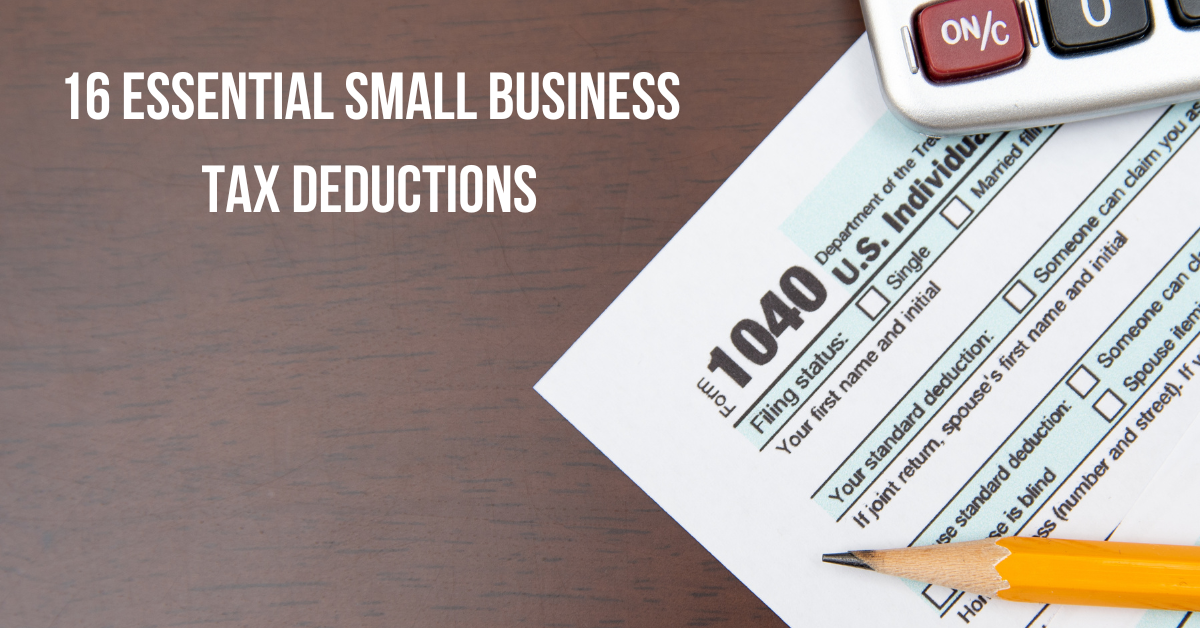Running a small business is not an easy task, but claiming tax deductions definitely makes it much more bearable on your wallet. Knowing and claiming the right deductions can help your business save thousands. Here’s a comprehensive guide on 16 small business tax deductions worth knowing to maximize your tax returns.
Home Office Deduction

In case a portion of the residence is used in conducting business exclusively, then this may give way for a home office deduction. This can include a portion of your mortgage, rent, utility bills, and other related expenses.
Home Office Deduction Criteria:
• The space must be used frequently and for business only.
• It is the principal place of business.
There are two methods to calculate the home office deduction: the Simplified Option for Home Office Deduction and the Regular Method. Under the simplified method, you can deduct $5 per square foot of your home used for business, up to a maximum of 300 square feet. The regular method calculates the actual expenses of your home office—such as mortgage interest, insurance, utilities, repairs, and depreciation—that are directly related to the percentage of business use of your home.
The rules governing home office deductions must be clearly understood because the IRS often scrutinizes incorrect claims. Your home office space should be clearly defined and used exclusively for business. For example, if you work in a spare bedroom, then it shouldn’t be used for any other purpose that can be construed as personal. Keep every related expense documented, as it is the key, and measure your home office square footage to know the exact amount that is deductible.
| Expense Type | Percentage Deductible |
| Mortgage Interest | Proportional |
| Rent | Proportional |
| Utilities | Proportional |
| Repairs and Maintenance | Proportional |
Business Use of Your Car

If you use your car for business, you can deduct the costs of using your car. There are two methods of calculating the deduction: the standard mileage rate or the actual expense method.
Standard Mileage Rate 2024: 58 cents per mile
Actual Expense Method:
• Gas
• Oil
• Tires
• Repairs and maintenance
• Depreciation
The standard mileage rate method is easy because you simply multiply the business miles by the IRS standard mileage rate. With the actual expense method, you must record all your expenses related to your vehicle and later take the business percentage, again based on miles traveled for business.
There are several factors that could influence one option over the other between these two approaches. The standard mileage rate is easy and requires less recordkeeping, so it’s the method of choice for many small business owners. If your car has high costs because of maintenance, repairs, or depreciation, the actual expense method may give you a larger deduction. The business miles must be logged, and all the receipts regarding vehicle expenses kept on file, as the IRS requires ample proof that may be needed to back up any claims filed.
| Method | Description |
| Standard Mileage Rate | Deduct a fixed rate per mile driven for business |
| Actual Expense Method | Deduct actual expenses incurred |
Business Travel Expenses

You can deduct travel expenses such as airfare, lodging, car rentals, and meals when you have business travel. Remember to maintain detailed records along with the receipts of all your expenses.
Examples of Deductible Business Travel Expenses
• Airfare
• Hotel stays
• Rental cars
• Meals (50% deductible)
• Laundry and dry cleaning
The trip must be purely for business for one to have travel expense deductions. In case you mix business with personal travel, only the business costs are deductible. One should maintain proper records of the purpose of the business trip, date, and expenses in detail.
The travel expenses should be ordinary and necessary for your business to be deductible. Ordinary expenses are common and accepted in your trade or business; necessary expenses, on the other hand, are appropriate and helpful. When documenting your travel expenses, include details such as the purpose of the trip, the people you met with, and how it relates to business activities. Including this type of detail will help if the IRS ever questions your deductions.
| Expense Type | Deductible Percentage |
| Airfare | 100% |
| Lodging | 100% |
| Rental Cars | 100% |
| Meals | 50% |
| Laundry | 100% |
Meals and Entertainment

The directly related test allows you to deduct 50 percent of the cost of meals that are directly related to your business. Meals associated with entertainment are not deductible, however, under the TCJA.
Meal Expenses That Qualify:
• Meals with clients
• Business meetings over meals
• Office snacks and beverages
It must directly relate to the active conduct of your business, and you must keep rigorous records of the amount, date, place, business purpose, and names of persons of the meal.
Although the entertainment expenses themselves no longer are deductible, meals that are a part of the events leading up to them are if they can be itemized separately on the receipt. To illustrate, if you have a client for a sporting event and you have a meal associated with it, you can only deduct the meal part if it’s separately stated. Good record-keeping and making sure all meal expenses have a clear business purpose can help maximize this deduction.
| Expense Type | Deductible Percentage |
| Meals with Clients | 50% |
| Business Meetings | 50% |
| Office Snacks | 50% |
Rent Expense

The amount you pay for rent of property your business uses is fully deductible. This includes office space, warehouses, and other facilities, or any other space used in business operations.
Types of Rent Expenses:
• Office Rent
• Warehouse Rent
• Retail Space Rent
Remember always that the rental should be of property used exclusively for business purposes. If you are renting your home to your business, you are allowed to deduct only the business portion of your rent.
Rent expenses may also include the amount paid for the leasing of equipment, such as computers, copiers, and other apparatuses involved in business operations. Sometimes, lease agreements can be very complicated, so it may be worthwhile going through the terms of a lease very carefully and making sure it is structured in such a way as to maximize possible deductions. Of course, be sure to pay rent in a timely fashion to avoid any kind of penalty or interest charge that may be levied against you. These are normally not allowed as deductions.
| Type of Rent | Deductible Percentage |
| Office Rent | 100% |
| Warehouse Rent | 100% |
| Retail Space Rent | 100% |
Utilities

Utility costs such as electricity, water, heating and internet used for the business are deductible.
Typical Utility Expenses:
• Electricity
• Water
• Heating
• Internet
These must be directly related only to your business operation. If you work from home you can only deduct the portion of utilities that relate to your home office.
For most businesses that pay rent for office space, utilities are added to the rent. If you pay utilities separately, these items should be tracked very carefully because utility costs may vary. Utility costs change, and it is important to be consistent in tracking throughout the year. If your business operates out of your home, use a percentage based on the square footage of the space of the business compared to the total square footage of the home.
| Utility Type | Deductible Percentage |
| Electricity | 100% |
| Water | 100% |
| Heating | 100% |
| Internet | 100% |
Office supplies

Any office supplies expense, such as paper, ink, pens, and others, that are utilized by the company on a daily basis in the course of the company’s business transactions, is fully deductible.
Examples of office supplies:
Paper
Inks and toners
Pens and Pencils
Notebooks
Make sure these goods are only utilized for business transactions; keep precise receipts and records for only documentation of your costs. Office supplies can also comprise software subscriptions as well as postage and shipping materials; these supplies are as important and useful in the business’s service or manufacturing lines. The inventory’s supplies can be utilized to account for the amount used and the requirement to order more; this
| Office Supply | Deductible Percentage |
| Paper | 100% |
| Ink and Toner | 100% |
| Pens and Pencils | 100% |
| Notebooks | 100% |
Salaries and Wages

Salaries and pay for your employees are deductible. This covers bonuses, commissions, and other types of payment.
Salaries and wages consist of the following components:
• Regular wages
• Payment for overtime work.
• Bonuses
• Commissions.
You can also deduct the employer’s share of payroll taxes, which includes Social Security and Medicare, federal and state unemployment taxes.
Payroll expenditures may be a significant deductible for many small businesses. Claiming these deductions requires accurate payroll records. This includes keeping accurate employee paperwork, such as W-2 and 1099 forms, and adhering to federal and state payroll tax rules. Offering attractive salary and perks may assist with tax deductions, as well as attracting and keeping top people.
| Component | Deductible Percentage |
| Regular Wages | 100% |
| Overtime Pay | 100% |
| Bonuses | 100% |
| Commissions | 100% |
Employee benefits

Deductible employee benefits include health insurance, retirement schemes, and other bonuses.
Common employee benefits:
• Health insurance and retirement programs.
• Paid leave.
• Tuition reimbursement
Offering competitive perks can help recruit and keep employees while also delivering considerable tax savings for your company.
Employee health insurance costs are entirely deductible, and self-employed persons may be eligible to deduct their health insurance payments as well. Retirement payments, such as those to 401(k) plans, can potentially give substantial tax breaks. Additional benefits such as tuition reimbursement and wellness programs can boost employee satisfaction and productivity while providing tax breaks to the company.
| Benefit Type | Deductible Percentage |
| Health Insurance | 100% |
| Retirement Plans | 100% |
| Paid Leave | 100% |
| Tuition Reimbursement | 100% |
Professional Services

Professional fees, such as legal, accounting, and consulting services, are deductible.
Professional services include legal, accounting, and consulting costs.
These costs must be directly tied to your business activities. Keep accurate records and receipts from service providers to justify your deductions.
Engaging specialists for legal, tax, and business guidance can help you avoid costly mistakes and stay compliant with rules. These treatments might be costly, but they are fully deductible. Regular discussions with accountants and legal consultants may assist to streamline corporate operations, improve financial planning, and strengthen overall business strategy.
| Service Type | Deductible Percentage |
| Legal Fees | 100% |
| Accounting Fees | 100% |
| Consulting Fees | 100% |
Advertisement and Marketing
Advertising and marketing costs for your company are completely deductible. This includes digital and print advertisements, as well as promotional items.
Examples of advertising and marketing costs include print, billboard, web, and promotional material.
Investing in advertising and marketing is essential for business growth and visibility. Make ensure that all expenses are directly related to advertising your firm.
Advertising and marketing costs can vary widely depending on the platforms and strategies used. Pay-per-click advertising, social media campaigns, and email marketing are prominent forms of digital marketing in today’s business environment. Both print advertisements and billboards are fully deductible. Monitor the effectiveness of marketing initiatives to optimize spending and ensure all costs are appropriately reported for tax purposes.
| Expense Type | Deductible Percentage |
| Online Ads | 100% |
| Print Ads | 100% |
| Billboards | 100% |
| Promotional Materials | 100% |
Insurance

Deductible business insurance premiums include those for liability, property, and workers’ compensation.
Common types of company insurance include the following:
Insurance coverage for liability.
Property insurance.
Worker’s comp insurance Adequate insurance coverage is crucial for protecting your business from any risks and liabilities.
Insurance must be part of every business’s risk management plan. Professional liability, product liability, business interruption insurance, and other policies cover a wide range of risks and are completely tax deductible. Review your insurance policies on a regular basis for proper coverage, and amend them as needed when your firm develops or changes in nature.
| Insurance Type | Deductible Percentage |
| Liability Insurance | 100% |
| Property Insurance | 100% |
| Workers’ Compensation | 100% |
Depreciation

Depreciation permits the deduction for the cost of an asset over the life of the asset. This can include business equipment, vehicles, and buildings.
Depreciable Assets :
• Office equipment.
• Plant and Machinery
• Vehicles
• Buildings
Depreciation is not a cash flow item; it is also one of the most significant items in reducing your taxable income. The Internal Revenue Service gives guidance as to how long various assets it deems to be useful for, and also the most appropriate depreciation method.
You’ll want to understand the different depreciation strategies, such as straight-line and accelerated, so you can determine which is the best for your business. The IRS has published detailed guidance on depreciating specific classes of assets, and tax preparation software or consulting with a tax professional will help you ensure depreciation is properly calculated. Accurate depreciations need an extremely complete record of all acquisitions of assets, with purchase price and date.
| Asset Type | Depreciation Period | Deductible Percentage |
| Office Equipment | Varies | Proportional |
| Machinery | Varies | Proportional |
| Vehicles | Varies | Proportional |
| Buildings | Varies | Proportional |
Education & Training

The costs of training yourself or your employees to improve the capacity and capability for your business can be deductible.
Example of Education and Training Expenses:
• Workshops and courses
• Seminars and webinars
• Certification programs
Education and Training can assist in the expansion of your business and also ensure that your employees are current on what is happening and are skilled.
Continuing education can also keep business owners and staff up-to-date with industry trends, provide skills needed to improve overall business performance. Courses, certificates, and seminars that are directly related to your business are deductibles. Online courses or webinars have become very popular, and you can also claim them as deductions on taxes. Save documents for proof of enrollment, attendance, and related expenses that all prove your deductions.
| Education Type | Deductible Percentage |
| Courses and Classes | 100% |
| Seminars | 100% |
| Certification Programs | 100% |
Business Interest and Bank Fees

The interest on business loans and bank fees that are related to your business accounts are, hence, deductible.
Common Business Interest and Bank Fees:
• Business loan interest
• Bank account fees
• Credit card fees
These will lower the total cost of borrowing and maintaining finance for your business.
The interest on the loans used for business is fully deductible, whether such a loan has been used to buy equipment, expand operations, or to cover operation expenses. Bank fees are also deductible and include monthly maintenance fees, overdraft fees, and wire transfer fees. Detailed records of interest paid and bank fees will help ensure that all the eligible expenses are accurately deducted.
| Fee Type | Deductible Percentage |
| Loan Interest | 100% |
| Bank Account Fees | 100% |
| Credit Card Fees | 100% |
Charitable Contributions

Donations to qualified charitable organizations are allowable deductions. Be sure to keep records of all donations and receipts.
Examples of Charitable Contributions:
• Cash donations
• Non-cash donations (goods and supplies)
Contributing to charitable causes not only supports your community but also provides tax benefits for your business.
Contributions to qualified charitable organizations are income tax deductible. These are non-profits, schools, and religious organizations. The organization must be approved by the IRS to receive contributions that can be deducted by you. Non-cash contributions of supplies, equipment, or inventory are deductible based on their current fair market value. Get receipts and keep records of all contributions for deductions.
| Contribution Type | Deductible Percentage |
| Cash Donations | 100% |
| Non-cash Donations | 100% |
FAQs
1. Can you deduct personal expenses as business expenses
You are disallowed to deduct personal expenses as business expenses. Only direct expenses related to the running of your business can you deduct. Inter-mixing personal and business expenses will always cause you problems with the IRS. Never mix your personal and business expenses. Open a strictly business related bank account and credit card so that all your business transactions are well documented.
2. As an individual taxpayer, how do I substantiate my expenses to the IRS?
Keep extensive records and receipts for all business expenses. This includes, but is not limited to invoices, bank statements, credit card statements, and any other supporting document you will later use in claiming deductions. Accounting software can simplify this, and you will have a record that cannot be easily lost. A good filing system, electronically and on paper, allows you to effortlessly access records if the IRS requests an audit.
3. Are there any limits on what I can write off?
Some, like meals (50% deductible) and charitable contributions, are limited. Be sure to check current IRS guidelines on the limitations of any deduction. Most charitable contributions are limited to 25 percent of your taxable income. Home office expenses and business use of your car are some other items that must be carefully calculated to arrive at the proper amount you can deduct.
4. Can I deduct my premiums for health insurance?
Premiums paid for health insurance for you and your employees are deductible. This applies for medical, dental, and vision insurance. You may also claim deductions for health insurance premiums you pay for yourself and your family if you are a self-employed individual. They might also provide tax benefits when provided as a benefit for employees, to maintain and hire employees.
5. How do I decide whether to use the standard mileage rate or actual expenses for my car?
Pick the method that will give you the biggest deduction. The standard mileage rate is easier to calculate. However, with the actual expense method, you need to keep receipts and other documents detailing your vehicle expenses, but you’ll generally get a bigger deduction if your vehicle expenditures are higher. Naturally, consider the simpler method and the potential for a higher deduction. Having a complete mileage log and all of your vehicle expense receipts will aid in determining more accurately which method is in your better interest.
6. What must I do if my return is audited?
Never panic in case of audit; remain calm and organized. Most importantly, keep all the relevant documents for the claimed deductions and answer all the IRS’s inquiries on time. Extensive and proper record maintenance will help you prove all your claims. You might need to contact a tax professional or an accountant to get through the process of an audit and to make sure you comply with every requirement the IRS asks for.
7. Can I deduct payments for contractors?
Yes, you are allowed to deduct the fees paid to independent contractors for work performed for your business. Remember to file Form 1099-NEC for each contractor to whom you pay $600 or more during any one year. Be sure to maintain adequate records of the payments along with a description of the services, as this will be necessary if the deductions have to be justified.
8. Are startup costs deductible?
Yes. These are deductible, but subject to limitations. You may automatically deduct up to $5,000 of the cost of organizing your business in the first year of operation. Other organizational costs must be written off over 15 years. Such costs may involve market studies, advertising, drafting of unit or share agreements, and expenses such as legal and accounting fees for the organization of the business
9. May I be permitted to deduct costs tied into upgrading my business/investment property?
Business property, usually, can’t be written off, but its value probably can be depreciated over time. Repairs and maintenance that keep an asset in good working condition, however, are deductible as business expenses. Therefore, it is of gigantic importance to differentiate repairs— which are allowed deductions— and improvements— which are depreciable.
10. How do I handle mixed-use asset deductions?
The costs can be deducted only if the assets are used for business; that’s in cases where the assets are used for both personal and official duties of work. For example, if you have a car that you use at work and for personal undertakings, you can only take a deduction from the costs incurred when the car was in use for work. This, therefore, calls for proper records on how and when the asset was in use for business in order to inform the amount deductible.

1 thought on “Maximize Your Savings: 16 Essential Small Business Tax Deductions You Need to Know”